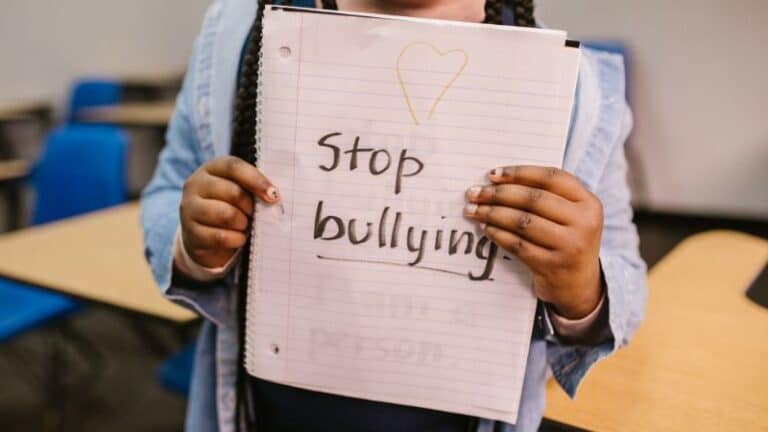Cyberbullying, like school bullying, is a major problem in the Philippines. It can have severe physical and emotional long-term consequences for students. Seven out of 10 Filipinos have experienced cyberbullying. It is more challenging to stop because cyberbullies think they can hide behind the screen and won’t suffer the consequences of bullying a classmate or a stranger.
We can fight cyberbullying through empathy, education, proactive measures, and legal recourse.
Let’s push back against online bullies and make the web safe for everyone. This guide suggest 29 ways to fight and stop cyberbullying.
What is cyberbullying?
Cyberbullying is electronic bullying. Bullies use technology to intimidate, threaten, stalk, ridicule, humiliate, taunt, and spread rumors about their target person. Cyberbullying is accomplished via email, text messages, social media, websites, video games, videos, or other forms of electronic communication.
While some believe that some examples of cyberbullying are part of growing up, studies show that the effect of cyberbullying maybe last longer than traditional bullying. Those who are targets of cyberbullying may suffer from low self-esteem, anger, depression, and even suicide.
In traditional bullying, victims may have some respite at home or in the classroom. In cyberbullying, our children can be targeted 24/7 every day of the year.
It is not safe to ignore cyberbullying.

18 Ways Parents Can Fight Cyberbullying
As a parent, you are the first line of defense against cyberbullying. You can help your children by being aware of what they’re doing online and by making sure they know how to handle situations that arise.
Work in partnership with the school and authorities. Do not fight it alone. Cyberbullying is a social problem, so we have to solve it together.
You must ensure that you won’t abuse others while protecting your child. A child being bullied is a victim. But keep in mind that many bullies are children too. We also need to save them.
Consider the tips that I will share. They are very practical. But always consult the help of experts and authorities. Why? Because that’s also what I would do.
Talk about positive online behavior.
Some bullies don’t know that they are already bullying others. Many kids think cursing and calling people names when playing games are normal.
Enter a computer shop in Metro Manila, especially one that allows people to play games. The place is usually noisy. I don’t understand how cursing makes them win. But that’s the picture.
Parents need to teach children the right behavior online.
A 7-year-old child can now watch things I had not seen when I was in college. You can now watch young kids dance like go-go dancers at nightclubs. For all we know, these kids are also abused by content creators who earn money for views.
We have to teach our children because, in the absence of our teaching, they’ll think every bad behavior is normal.
Talk about positive online behavior and kindness on social media with your children. It’s also important to teach them how to be safe in cyberspace by teaching them how not to get caught up in cyberbullying themselves.
We must teach how not to be a bully. We don’t want other parents to seek the help of authorities to hunt our children. We also don’t want our children to become victims of children who bully online. Cyberbullying can take many forms:
- Sending mean messages
- Posting embarrassing photographs or video clips
- Posting unwanted images of yourself online
- Making fun of someone else’s appearance
Cyberbullying often occurs behind closed doors — like when one person posts unflattering photos about another person without permission — but it can happen anywhere there are computers and smartphones available for use (schools, libraries/community centers).
It is often the case that someone who felt bullied online will return the favor and become a bully. Or worst, think that what’s done to them by online bullies could be done to others.

Model good online behavior.
Aside from teaching the way, we ought to model the way. Don’t be a bully. And show what can be done when being bullied.
If your child is bullied online, modeling good behavior is necessary.
Remember that the Internet can be an excellent place for kids to learn about different cultures and ideas, but it also has its downsides—including cyberbullying.
When your child interacts with other people on social media sites like Tiktok, Facebook, or Instagram, ensure she knows how important it is to show kindness and good behavior at all times.
For example: If one of your children receives an email from someone who tells her she doesn’t like her outfit or hair color, say something like, “I’m sorry this happened; please do not respond!”
Then change the subject of conversation so everyone feels comfortable again (and hopefully, these kind words will make their day).
Note: Facebook nowadays is a toxic place. Paid trolls are everywhere. They spread lies. At times, I find myself answering them. I have been called names too. They’ll bring out the worst in you. So, let’s be careful. We don’t want our kids to think that it is okay to quarrel with strangers (and people you know).
Discuss what is considered “acceptable” behavior on social media.
It’s important to discuss what is considered “acceptable” behavior on social media in your home. For example, it’s not okay to bully someone online.
Protect your children from cyberbullying. Set up parental controls on their devices so they can use them safely without having too much access or knowledge of what they can see or do online.
Teach them why some things, most especially on Tiktok, are not good for kids.
In the Philippines, I don’t see the government or any of its agencies acting against cyberbullying. It seems everyone is a fair game for online trolls and bashers. A single comment can hurt children, but the commenters don’t think much about it.
Teach children how to report bullying or harassment through an app like Zift.
Offer to help your child make changes to their accounts if necessary.
I recommend you and your child watch the videos on Dalir-Eskwela. You may download the video here.
Educate your child about cyberbullying.
Explain how cyberbullying differs from face-to-face bullying and why bullies think it’s easier to hide behind screens. Be sure they know it’s okay to tell you immediately if they are being bullied online and offline.
Our kids need to need the consequences of being a bully too. They must know that it is not cool to make fun of others. That even a joke, when done repeatedly at the expense of someone, can be considered bullying.
I highly recommend reading this excellent article from Unicef: How to talk to your children about bullying.
Tell them to keep their information private.
Filipinos love to share their whereabouts and the food they eat. On Tiktok, we see kids dancing like sexy dancers. Adults make fun of kids for “entertainment” purposes. And our kids see all of these on reels (Facebook) and shorts (Youtube).
I don’t think adults must share wherever they are. I don’t mind seeing the pictures of the food they eat. But it is not okay to involve kids.
Teach your child to keep their personal information private on social media websites like Facebook and Twitter (so other people don’t see things like where you live).
Ask kids if they share personal information online. For example, are they showing too much about themselves or themselves in photos/videos?
Teach them what to do when people ask them for personal information. For example, let them know that some people may pose as somebody they know. And when somebody asks about something too personal (naked photo), it is alright to say no.
Establish mutual trust.
Trust is essential in any relationship, including your relationship with your child. If you don’t trust them, they won’t either. Unfortunately, establishing trust can be difficult when your child is experiencing cyberbullying.
This can be especially true if kids aren’t using social media as much as others their age. So help them become familiar with social media and bond with friends and classmates.
Help them create chatgroups with friends and classmates who share similar interests. Technology is a terrific help if we help kids use it for good.
When Kids Are Cyberbullied
If you suspect your child is cyberbullied, talk to him about it.
Seek help from others too. You may be surprised by the number of people willing and able to help your child with the situation.
If you aren’t sure how to do this, ask someone in your community who is an expert on bullying or cyberbullying (a teacher, social worker, therapist, or coach) for advice on how best to approach this issue with your child.
You can talk to your child about what happened, how they felt, and how they want to move forward.
You can ask your child if you can do anything for her. Doing this will give her confidence because she knows you will always be there for her no matter what happens or how bad it gets.
Seek interventions for the bullies too. Children bullies need our help. The school should be able to help you. The Anti-bullying Act mandates our schools to come up with comprehensive and inclusive anti-bullying policies and programs. Many of our teachers are trained to handle bullying.
If the bully continues with his bad behavior after receiving intervention from family members, teachers, and others involved in their life (such as coaches), consult a lawyer.
Keep communication channels open.
If you know your child is having trouble with cyberbullying, talk to her about it and ensure she knows you’re there for her.
Communicate often so your child won’t have to spend most of her time behind the computer screen or phone. Teach her how to communicate with people too. If you were to ask me, I would say that online games cannot replace the games I played when I was young. The games I played allowed me to grow socially, physically, and emotionally.
Face-to-face communication with friends is a lot healthier than spending time with online bashers. Trust me.
Be patient while he learns new ways to interact online safely.

Be mindful of your child’s social media accounts.
Keep an eye on your child’s social media accounts. You can monitor his smartphone or computer use, and some apps allow you to monitor all activity easily.
If possible, set up parental controls so that only adult people can see adult content.
Monitor what games your son/daughter plays online!
Look into how many friends your child has online. Ensure he doesn’t talk about anything inappropriate while playing games with friends and strangers. Also, ensure he doesn’t spend too much time playing games daily.
When I catch my child (a boy) playing violent games (and many games are violent), I tell him why it is inappropriate for his age and that it is not okay to kill people for pleasure, though it is just a game.
I also caught him one day playing with someone who spewed curses every 10 seconds. Some gamers often use words like idiot, boneheads, crap, and motherfather when they talk to others.
Start to talk early and often.
Engage your child in conversations. Ask questions about her experiences in school. Talk about what she sees online too.
If you’re worried your kid may be engaging in cyberbullying behavior, don’t wait until school starts again. Bullied children are not safe. Likewise, children who bully are not safe too.
But make sure also that you don’t label your kid a bully. We use the word bully here because it is something most people understand. But no one is born a bully. It is a label that ruins self-esteem.
I think it is right to say that one is a child being bullied by another child who does bullying acts.
A child is a child, no matter what the act is.
Explain the consequences of cyberbullying.
If your child is a cyberbullying victim, explain how it feels and how the other person’s actions can affect them emotionally.
Make sure your child knows that people can get hurt when they’re being bullied online and that if they want to stop it from happening, they need to tell someone about it—the school principal or a teacher could be an excellent resource for this purpose.
When a Child Tells You About Cyberbullying
Listen carefully and show that you care by thanking them for telling you the story. Don’t make quick judgments, though.
Ask your child how she felt about her experience. Even if she says she feels okay, she must understand that bullying must stop before it hurts someone.
Encourage your child to stand up for other kids online.
When you see a bullying situation, you must speak out against it. If you are in a position to help solve the problem, take action and ensure that the bully knows their actions are not okay.
Your child needs to realize that standing up for others can sometimes be difficult but necessary, especially when dealing with cyberbullying.
Standing up for someone means discouraging the bully (if a friend). If that is not an option, encourage your child to tell you about the situation.
Save evidence of the bullying.
If you have a photo or video that shows what happened in your child’s school or online: keep it safe and secure on your device.
If you don’t want to do anything about bullying (for whatever reason), it is still best to secure evidence. Take a screenshot and send it to your email address as soon as possible so that there will be no chance for them to erase any proof or delete their posts from social media sites. You may need the evidence one day.
Report the cyberbullying to the website’s administrators.
If you’re on Facebook, click “Report a Problem.”
If you’re on Twitter, click “Report Abuse.”
If your child has been a victim of cyberbullying, he must know how to report this behavior and what will happen after.
Never respond to messages from the cyberbully.
Responding to bullies will only give them more ammunition and make you look like a victim, which they want you to be.
If someone has threatened your child on social media or sent him nasty messages via text or email, report it immediately by calling the local police department or emailing them at [insert link here].
Explain what happened and ask for help closing their account(s) so they can’t continue posting offensive material. You can also contact Facebook directly through their website here: www.facebook.com/safety
Get in touch with a lawyer.
If you want to take legal action against cyberbullying, hiring an attorney is important. While the Anti-bullying law has a limited scope, there are other Philippine laws you can use against abuse.
Consider working with the school if social media abuse continues offline.
If the bullying continues, consider working with the school. It may be possible to work out a solution involving some punishment or consequence for the student harassing you online.
The school could also help you develop strategies for dealing with cyberbullying, such as setting up an anonymous reporting system and a code of conduct around Internet usage at school.
Schools try their best to improve things but still can’t control everything in their classrooms or hallways. But don’t lose hope. Parents and teachers must keep working together to keep schools safe for kids.

3 Ways Teachers Can Fight Cyberbullying.
Cyberbullying is any action that involves the use of technology to bully another person. Cyberbullying includes both verbal and nonverbal forms of harassment, including threats, intimidation, and offensive language.
Cyberbullying is often viewed as a more dangerous form of bullying because it takes place online rather than face-to-face.
It is difficult for teachers who don’t have access to children’s phones or computers in school; however, there are ways you can help prevent cyberbullying from happening in your classroom!
Ask your school to implement an anti-bullying policy.
Schools should have an anti-bullying policy in place. But if you feel the implementation is weak, you can ask to strengthen it.
Schools can help prevent cyberbullying.
- Provide parents with information on how to recognize and report instances of cyberbullying, including the ability to contact police or school officials if necessary.
- Educate students about appropriate behavior online, such as not sharing personal information online and respecting one’s peers’ privacy rights.
- Teach your students how to recognize cyberbullying. Your students should learn that cyberbullying is a form of harassment, and they should know what the signs are. For example, if a student has been threatened or harassed in school and receives similar threats online, his teacher can help him understand that this behavior is unacceptable.
- Tell students about the consequences of online bullying. Students must know what will happen if they engage in cyberbullying.
Resources
Be guided by DepEd Order No. 4 s 2012 or the DepEd Child Protection Policy. Download the document.
Read also the IRR of RA 10627 or the Anti-Bullying Act of 2013.
DepEd reminded schools that the Anti-Bullying Program must be comprehensive and multifaceted. Read this.
Empower students to speak up.
Prevent cyberbullying by empowering your students to speak up. Teach them how to identify bullying, what constitutes it, and how they can respond as bystanders or victims.
Talk about how students who are being bullied can seek help from adults or peers.
Use social media to spread awareness of the problem and its impact on people’s lives.
Use social media to spread awareness about cyberbullying and its impact on students’ life. You can create a video or blog about it too.
Please encourage students to use social media responsibly, and make them aware that others can share anything they post.

8 Ways Children Can Fight cyberbullying.
Get your friends and loved ones involved.
Remember, you’re not alone. If you’re going through a tough time, consider reaching out for support from people you trust. Your friends, family, and teachers can help you.
Talk to an adult.
If you’re being bullied online or through social media, talk with an adult at school—your teacher, principal, or counselor may be able to provide support during these difficult times.
Don’t just be a bystander.
If someone ( a classmate) is bullied online or in school by someone else, you should immediately tell an adult so that they can help the victim.
Talk to a counselor.
If you’re having trouble dealing with cyberbullying, there are a few things to remember. First, talk to someone like a counselor or therapist if you need help coping with online bullying.
Don’t give up on your friends.
Don’t give up on your friends who bully others online—they may not realize how much damage they’re doing! Instead, convince them to stop bullying others.
Think before you respond.
When you see an upsetting post, take a moment to think about how you might respond. Think about what type of reaction would be helpful for the person who posted the offensive material.
Ask yourself if there is any way you can help by reporting them or blocking them on social media platforms like Facebook and Instagram.
Report or block content.
Stop cyberbullying by reporting or blocking content that violates the platforms’ terms of service. For example, if a user posts something you find offensive, you can use Facebook’s reporting feature and email system to request that they remove the post.
You can also block users who post harassing or violent messages directly on Twitter by clicking on their profile picture at the top left corner, then selecting “block.”
If you become a target of a troll online, tell your parents.
Do not respond to cyberbullying with more abuse.
When you are cyberbullied, it can be tempting to respond with more abuse. But doing so may make things worse. So don’t post anything when you are angry.
We can stop cyberbullying.
As a parent or educator, it is important to talk openly and honestly with kids and teach them how to be respectful online and what they can do if they feel cyberbullied or hear mean things being said about others.
Kids should know that no matter what anyone else says about them, it doesn’t make them less of a person.
I hope this article has provided parents and educators with some helpful tips to help kids bullied online. And may students find the courage to seek help from adults so we can all stop bullying.
If you’re tired of knowing but not doing…
Let’s make one shift easier to live daily.
→ Shift Experiences


